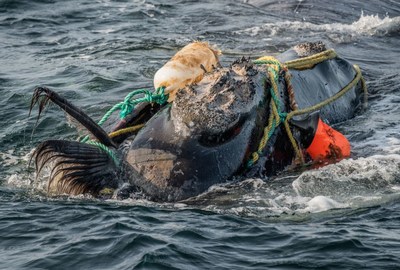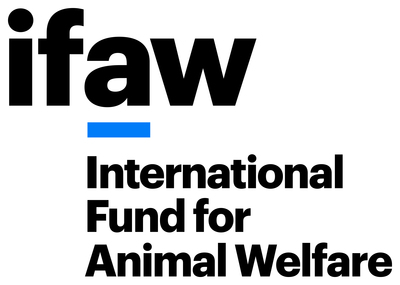Recent Calf Death a Blow in a Tenuous Tale of Survival
WASHINGTON, Feb. 19, 2021 /PRNewswire/ -- This World Whale Day (Feb. 21st), just fourteen calves offer hope for the survival of the North Atlantic right whale, a critically endangered species on the brink of extinction. Though the trend of this recent calving season is positive, the situation remains tenuous, given the recent tragic death of a calf reported just last week. This is according to the International Fund for Animal Welfare (IFAW) which has led a multi-lateral campaign across the US and Canada to restore this once thriving species since 2017.
Once numbering in the tens of thousands, the species estimates now hover at only 360 total individuals, driven to scarcity primarily from incidental entanglement in commercial fishing gear and unintended vessel collisions. Ocean noise is a third factor, also immensely harmful to the species.
Endearingly referred to by some as the 'Class of 2021', the existence of these fourteen young calves, five of which were born to first-time mothers, is critical to the survival of the species following years of severe shortfalls in new right whale calve births. Sadly, one of the 15 calves born this calving season was reported dead and stranded off the coast of Florida on February 13th. The calf showed obvious signs of trauma from vessel strike and is the first right whale death reported in U.S. waters this year, and the third calf death reported over the last thirteen months.
The now fourteen members of the Class of 2021 is an encouraging development and one to be celebrated this World Whale Day," says IFAW Marine Campaigner CT Harry, who leads the North Atlantic right whale program effort. "However, we must face hard truths at the same time. The challenges faced by these calves and the species as a whole are immense. Without swift, proactive action on multiple fronts, their survival is far from assured."
These calves, along with their mothers and respective pods, have begun a perilous journey to feeding grounds off the shores of Cape Cod up to the Gulf of St. Lawrence in Canada, maneuvering through an industrial waterway dense with shipping traffic and an estimated one million commercial vertical fishing lines in the water column. The immense amount of threats encountered in such a journey can ultimately affect the growth and reproductive development of right whales as they endure conditions that inflict both short and long-term stress.
IFAW is engaged in a collaborative effort alongside the fishing industry, gear manufacturers, and government legislators, to ensure safe passage of all North Atlantic right whales, including the calves that make up the Class of 2021. IFAW ensures it brings all parties to the table in the search for a long-term solution. Currently, the key elements of this effort include:
- Testing and promoting the development and adoption of ropeless fishing gear technology which would significantly reduce the risk of entanglement;
- Advocating for critical legislation including the SAVE Right Whales Act which provides sustained funding for research and development into life-saving technologies that provide long-term solutions;
- Advocating for maritime regulations that include expansion of existing speed restrictions and altering shipping lanes to reduce vessel strikes;
- Assisting in the development of Whale Alert, a situational awareness app for mariners to avoid potential for vessel strike; and
- Educating consumers about the existence of safer fishing practices and advocating for the introduction of whale-friendly seafood.
According to Harry, "This is one of the most pressing marine conservation challenges of our day. It is our responsibility to ensure the Class of 2021 successfully navigates the ocean and can do so long into the future along with their own young as well. If human activity has brought the North Atlantic right whale to this critical tipping point, then human proactivity, collaboration, and 21st century innovation can save it."
To take action for the North Atlantic right whale click here.
For more information, images, or to arrange interviews, please contact:
Rodger Correa at [email protected].
About the International Fund for Animal Welfare (IFAW) ? The International Fund for Animal Welfare is a global non-profit helping animals and people thrive together. We are experts and everyday people, working across seas, oceans and in more than 40 countries around the world. We rescue, rehabilitate and release animals, and we restore and protect their natural habitats. The problems we're up against are urgent and complicated. To solve them, we match fresh thinking with bold action. We partner with local communities, governments, non-governmental organizations and businesses. Together, we pioneer new and innovative ways to help all species flourish. See how at ifaw.org.
SOURCE International Fund for Animal Welfare
News published on and distributed by:





